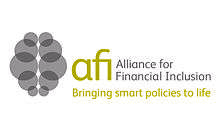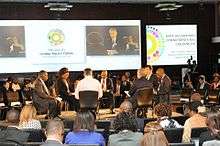Alliance for Financial Inclusion
 Logo of the Alliance for Financial Inclusion | |
| Abbreviation | AFI |
|---|---|
| Motto | Bringing Smart Policies to Life |
| Formation | January 1, 2008 |
| Type | Policy institute, capacity building and peer-learning network |
| Legal status | Non-governmental organization |
| Purpose | Advancing the development and implementation of financial inclusion policies in developing and emerging economies |
| Headquarters | Kuala Lumpur, Malaysia |
Executive Director | Alfred Hannig |
Staff | 50 |
| Website | https://www.afi-global.org/ |
The Alliance for Financial Inclusion (AFI)[1] is a network of financial inclusion policymakers. AFI is led by its members and partners, central banks and other financial regulatory institutions from developing economies. The AFI Network includes member institutions from more than 80 countries.
AFI is currently headquartered in Kuala Lumpur, Malaysia. The Executive Director is Professor Alfred Hannig of Germany, who has held the post since 2008.[2] The organization currently receives funding from the Bill & Melinda Gates Foundation[3] and administered on behalf of its members by the German Technical Corporation.[2] The organization has three working languages: English, French and Spanish.
Organization and Mission
AFI's core mission is to encourage the adoption of inclusive financial policies in developing and emerging economies, promote financial inclusion, and improve the standard of living of the 2.5 billion humans who are currently financially excluded. AFI was founded in 2008 as a Bill & Melinda Gates Foundation-funded project,[4] in conjunction with AusAid,[5] with the goal of advancing the development of financial inclusion policy in developing and emerging economies. AFI's network has more than 100 institutions from more than 89 member nations.
AFI utilizes a peer-to-peer learning model to connect, encourage, and enable financial policymakers to interact and exchange knowledge on policy initiatives such as consumer protection, mobile financial services,[6] financial integrity, agent banking, formalizing microsavings, data and measurement, and general financial inclusion. AFI has pioneered regional approaches to knowledge exchange among policymakers and stakeholders worldwide, notably within the Pacific Islands,[7] Africa,[8] and Latin America. This information interchange is intended to build a more comprehensive knowledge base of financial inclusion, and the subsequent formulation and implementation of effective policy by members institutions in their home countries. AFI also operates the AFI Data Portal, a unique and integrated global database on financial inclusion policies, regulations, and outcomes. Housing information sourced directly from policymakers and regulators, the ADP empowers countries to share their financial inclusion stories through data, formulate policies based on data, while at the same time facilitating the study and understanding of trends in financial inclusion.
AFI administers several types of financial inclusion policy related activities, including a membership program, the convening of working groups, the provision of grants, and a Policy Champions Program. It also hosts the annual AFI Global Policy Forum (GPF), the world's most important and most comprehensive forum for regulatory institutions with an interest in promoting financial inclusion policy, and championed the Maya Declaration, the first global and measurable set of financial inclusion commitments by developing and emerging economies.
History
The Alliance for Financial Inclusion was founded in 2008 as a Bill & Melinda Gates Foundation-funded project to advance the development of smart financial inclusion policies in developing and emerging countries. Bank Indonesia (BI), Bank of Thailand (BOT), Central Bank of Kenya (CBK), Bangko Sentral ng Pilipinas (BSP), Superintendencia de Banca, Seguros (SBS) y AFP de Peru and Comisión Nacional Bancaria y de Valores (CNBV) of Mexico comprised the initial core group of six member institutions.
In 2010, the Group of 20 nominated AFI as one of three implementing partners for the Group of 20 Global Partnership for Financial Inclusion (GPFI). In this role, the AFI brings innovative policies for increasing access to financial services from developing countries to the wider Group of 20 forum, and facilitates the participation of non-Group of 20 policymakers in developing and emerging economies participate in the GPFI work.[9]
In 2011, AFI members collectively adopted the Maya Declaration, a statement of intent to make financial inclusion a centerpiece of national efforts for poverty reduction, economic stability, and economic development. More than 30 AFI members then went a step further by announcing specific and measurable commitments. In recognition of these developments, both the G20 and the Group of 24 highlighted the AFI learning model and the Maya Declaration as key steps toward global economic development, with the G20 urging its members to commit to the Maya Declaration.[10]
In 2012, at the Global Policy Forum (GPF), members of the AFI Network began a process to transform AFI from a short-term project into a permanent member-funded international organization.
In 2013, AFI reached 100 member institutions overall with the addition of the Central Bank of Trinidad and Tobago.[11]
In 2018, AFI celebrated its 10th anniversary at its Global Policy Forum in Sochi, Russia.
The Global Policy Forum

The Global Policy Forum (GPF) is organized annually by AFI and is the keystone event for its membership.
The first GPF was co-hosted by the Central Bank of Kenya (CBK) in September 2009 in Nairobi, Kenya, and attracted nearly 100 central bankers and other financial policymakers [12] providing a platform for central banks and other policy making bodies in developing countries to engage in dialogue and share knowledge and experiences in expanding access to financial services.[13] In his opening remarks, the Governor of the Central Bank of Kenya, Prof. Njuguna Ndung'u, summarized the goal of the GPF when he stated: "We will, over the next three days, share experiences on smart financial inclusion policies that have worked elsewhere. We will thereafter adopt these policies to suit our respective countries as we work together to push forward the global financial access frontiers."[14]
Partners
AFI partners with a number of organizations with an interest in financial inclusion, from inter-governmental and standard-setting bodies (SSBs) to development banks, development agencies, research organizations, industry associations, and the private sector. AFI partners include the World Bank, United Nations Capital Development Fund, United States Agency for International Development (USAID), World Economic Forum, Russian Microfinance Center, Inter-American Development Bank, GSMA, the Group of Twenty Four (G24), the Group of Twenty (G20), Consultative Group to Assist the Poor, and the Asian Development Bank.
See also
References
- ↑ Alliance for Financial Inclusion Official Website
- 1 2 Andrew Ross Sorkin (21 September 2009). "Gates Foundation Pledges $35 Million for Banking Innovation". Venture capital: DealBook. New York Times. Retrieved 21 August 2013.
Alfred Hannig, executive director of the Alliance for Financial Inclusion, said banking innovation is happening in developing countries
- ↑ Bill & Melinda Gates Foundation: Illustrative Grants Commitment
- ↑ Gates Foundation Financial Services for the Poor Partners Page
- ↑ Report to AusAID about the use of funding received in support of AFI's activities on the GPFI
- ↑ Financial Times: Banking Goes Mobile in Mexico
- ↑ United Nations Capital Development Fund: AFI Pacific Islands Working Group Prioritizes Consumer Protection for 2012
- ↑ Mobile Money Africa: African Policymakers Launch Groundbreaking Mobile Financial Services Initiative AMPI
- ↑ Australian Government AusAid
- ↑ G20 Official Outcome Statement, Article 10
- ↑ The Trinidad and Tobago Guardian: Central Bank of T&T joins AFI
- ↑ Bill & Melinda Gates Foundation: AFI Develops Financial Services for the Poor
- ↑ GSMA: Highlights from 2009 Alliance for Financial Inclusion Global Policy Forum
- ↑ Central Bank of Kenya: Governor's Remarks at the 2009 AFI Global Policy Forum